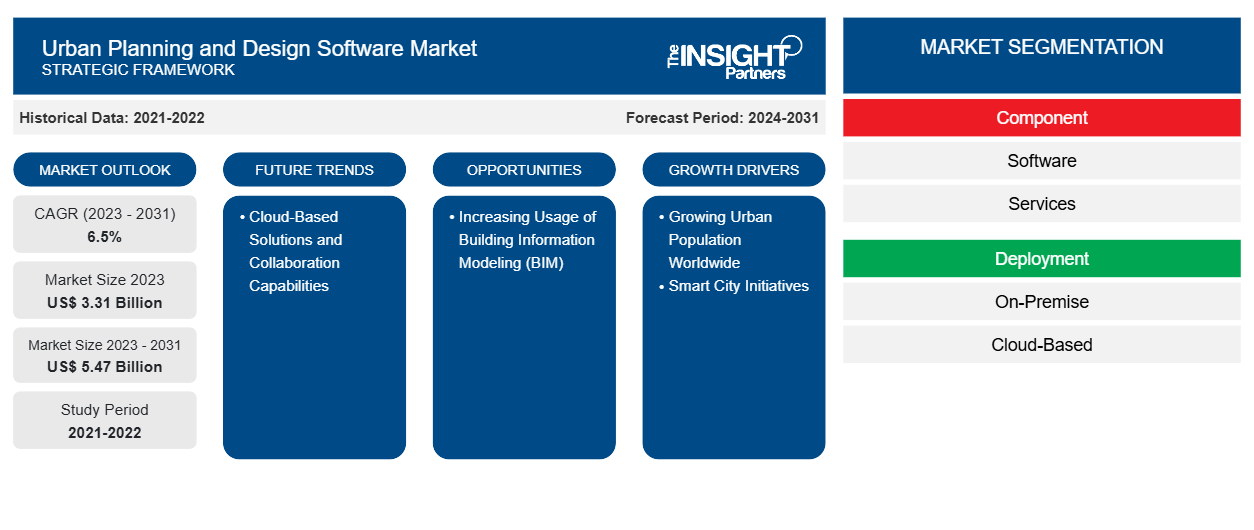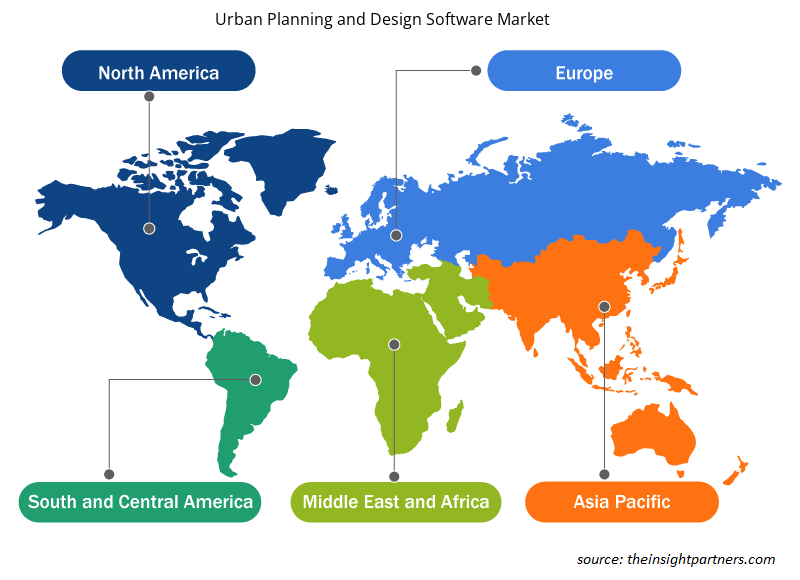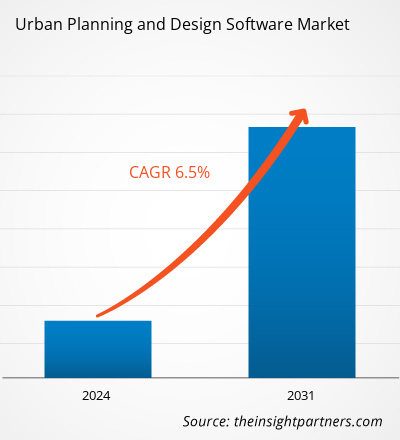The urban planning and design software market size is projected to reach US$ 5.47 billion by 2031 from US$ 3.31 billion in 2023. The market is expected to register a CAGR of 6.5% during 2023–2031. Growing urban population worldwide and smart city initiatives are likely to remain key trends in the market.
Urban Planning and Design Software Market Analysis
Cloud-based platforms are becoming more and more popular as a result of digital transformation because of their easy implementation and lower costs. Cloud-based platforms are also accessible to end users because of the internet infrastructure that has been constructed in industrialized nations and is growing in a number of developing nations. Secure hosting of important data, enhanced security and scalability, and speedy file recovery are a few advantages of cloud-based urban planning and design software. A private or shared cloud hosting platform is used to store backups. Thus, vital server data can be promptly recovered by organisations. Furthermore, the data is easily accessible from any location with secure logins and a reliable internet connection. Additionally reducing repair and maintenance costs and increasing customer satisfaction are cloud-based urban planning and design software.
Urban Planning and Design Software Market Overview
Software for urban planning and design is used to create 3D models of urban surroundings and develop urban layouts. Architects and city planners use software for urban planning and design to visualize how their plans might seem in the real world. Urban designers can improve their recommendations for urban planning and create urban layouts that comply with local zoning laws by producing 3D visualizations. Users can automatically import real-world structures into their urban planning and design software by integrating GIS software with it. Users benefit from time savings, and urban planners are able to construct around the existing infrastructure of an urban environment.
Customize This Report To Suit Your Requirement
You will get customization on any report - free of charge - including parts of this report, or country-level analysis, Excel Data pack, as well as avail great offers and discounts for start-ups & universities
Urban Planning and Design Software Market: Strategic Insights

- Get Top Key Market Trends of this report.This FREE sample will include data analysis, ranging from market trends to estimates and forecasts.
You will get customization on any report - free of charge - including parts of this report, or country-level analysis, Excel Data pack, as well as avail great offers and discounts for start-ups & universities
Urban Planning and Design Software Market: Strategic Insights

- Get Top Key Market Trends of this report.This FREE sample will include data analysis, ranging from market trends to estimates and forecasts.
Urban Planning and Design Software Market Drivers and Opportunities
Growing Urban Population Worldwide to Favor Market
According to The World Bank, as of now approximately 56% of the world's population, which amounts to 4.4 billion inhabitants, resides in cities. This trend is projected to persist, with the urban population more than doubling up its current size by 2050, at which point nearly 7 out of 10 people will live in cities. The continuous growth in the world's urban population is projected to create a need for developing new structures, including both commercial and residential buildings. Consequently, there will be a demand for urban planning and design software to facilitate the construction of these infrastructures. For instance, companies such as SketchUp (Trimble Inc.) offer urban design software that aids planners in their tasks by leveraging computer-aided design (CAD) and geolocation tools within the SketchUp city planner's toolkit, enabling them to progress from conceptual models to proposals.
Increasing Usage of Building Information Modeling (BIM)
Building Information Modeling (BIM) is a cutting-edge technology that is gaining more and more traction in urban planning. It involves developing a digital representation of a building or infrastructure project, containing detailed information about its design, construction, and upkeep. This data is kept in a central database that can be accessed by different parties involved in the project from start to finish. Through the use of BIM, urban planners obtain a thorough and up-to-date view of a project, resulting in fewer mistakes, improved communication, and faster construction processes. Furthermore, BIM guarantees that projects meet the highest standards and comply with all regulatory mandates.
Urban Planning and Design Software Market Report Segmentation Analysis
Key segments that contributed to the derivation of the urban planning and design software market analysis are component, deployment, and application.
- Based on component, the market is segmented into software and services. The software segment held a significant market share in 2023.
- In terms of deployment, the market is divided into on-premises and cloud-based. The on-premises segment held a substantial share of the market in 2023.
- Based on application, the market is segmented into architects, city planners, and creative departments. The architects segment held a significant market share in 2023.
Urban Planning and Design Software Market Share Analysis by Geography
The geographic scope of the urban planning and design software market report is mainly divided into five regions: North America, Asia Pacific, Europe, Middle East & Africa, and South & Central America.
North America is projected to hold a significant revenue share of the urban planning and design software market. According to the United Nations Development Programme, more than 60% of the world's population lives in cities, consisting of more than 70% working population; also, 80% of the world's economic value is generated in cities. Smart city initiatives involve adopting various smart technologies, including urban planning and design software, that make operations more energy efficient and sustainable, as well as minimize carbon emissions. Therefore, rising initiatives in smart city projects are anticipated to create various opportunities for market growth during the forecast period.
Urban Planning and Design Software Market Regional Insights
The regional trends and factors influencing the Urban Planning and Design Software Market throughout the forecast period have been thoroughly explained by the analysts at Insight Partners. This section also discusses Urban Planning and Design Software Market segments and geography across North America, Europe, Asia Pacific, Middle East and Africa, and South and Central America.

- Get the Regional Specific Data for Urban Planning and Design Software Market
Urban Planning and Design Software Market Report Scope
| Report Attribute | Details |
|---|---|
| Market size in 2023 | US$ 3.31 Billion |
| Market Size by 2031 | US$ 5.47 Billion |
| Global CAGR (2023 - 2031) | 6.5% |
| Historical Data | 2021-2022 |
| Forecast period | 2024-2031 |
| Segments Covered |
By Component
|
| Regions and Countries Covered | North America
|
| Market leaders and key company profiles |
Urban Planning and Design Software Market Players Density: Understanding Its Impact on Business Dynamics
The Urban Planning and Design Software Market is growing rapidly, driven by increasing end-user demand due to factors such as evolving consumer preferences, technological advancements, and greater awareness of the product's benefits. As demand rises, businesses are expanding their offerings, innovating to meet consumer needs, and capitalizing on emerging trends, which further fuels market growth.
Market players density refers to the distribution of firms or companies operating within a particular market or industry. It indicates how many competitors (market players) are present in a given market space relative to its size or total market value.
Major Companies operating in the Urban Planning and Design Software Market are:
- Bentley Systems Incorporated
- Modelur
- SIMWALK
- SketchUp
- UrbanFootprint
- Urbansim
Disclaimer: The companies listed above are not ranked in any particular order.

- Get the Urban Planning and Design Software Market top key players overview
Urban Planning and Design Software Market News and Recent Developments
The urban planning and design software market is evaluated by gathering qualitative and quantitative data post primary and secondary research, which includes important corporate publications, association data, and databases. A few of the developments in the urban planning and design software market are listed below:
- Today, at Autodesk University, Autodesk, Inc. (NASDAQ: ADSK) announced a strategic collaboration with Epic Games to accelerate immersive real-time (RT) experiences across industries, with an initial focus on Architecture, Engineering and Construction (AEC).
(Source: AUTODESK INC., Press Release, September 2022)
Urban Planning and Design Software Market Report Coverage and Deliverables
The “Urban Planning and Design Software Market Size and Forecast (2021–2031)” report provides a detailed analysis of the market covering below areas:
- Urban planning and design software market size and forecast at global, regional, and country levels for all the key market segments covered under the scope
- Urban planning and design software market trends as well as market dynamics such as drivers, restraints, and key opportunities
- Detailed PEST/Porter’s Five Forces and SWOT analysis
- Urban planning and design software market analysis covering key market trends, global and regional framework, major players, regulations, and recent market developments
- Industry landscape and competition analysis covering market concentration, heat map analysis, prominent players, and recent developments for the urban planning and design software market
- Detailed company profiles
Frequently Asked Questions
What are the driving factors impacting the urban planning and design software market?
Growing urban population worldwide and smart city initiatives are driving the market.
What are the future trends of the urban planning and design software market?
Cloud-based solutions and collaboration capabilities are key trends in the market.
Which are the leading players operating in the urban planning and design software market?
Bentley Systems Incorporated, Modelur, SIMWALK, SketchUp, UrbanFootprint, UrbanSim, T-Sqaure Engineering, Inc., Esri, Holistic City Limited, and Act-3D are major players in the market.
What would be the estimated value of the urban planning and design software market by 2031?
The market is expected to reach a value of US$ 5.47 billion by 2031.
What is the expected CAGR of the urban planning and design software market?
The market is anticipated to record a CAGR of 6.5% during 2023–2031.
- Historical Analysis (2 Years), Base Year, Forecast (7 Years) with CAGR
- PEST and SWOT Analysis
- Market Size Value / Volume - Global, Regional, Country
- Industry and Competitive Landscape
- Excel Dataset
- Parking Meter Apps Market
- eSIM Market
- Advanced Distributed Management System Market
- Online Exam Proctoring Market
- Electronic Data Interchange Market
- Barcode Software Market
- Maritime Analytics Market
- Cloud Manufacturing Execution System (MES) Market
- Robotic Process Automation Market
- Digital Signature Market
Testimonials
I wish to appreciate your support and the professionalism you displayed in the course of attending to my request for information regarding to infectious disease IVD market in Nigeria. I appreciate your patience, your guidance, and the fact that you were willing to offer a discount, which eventually made it possible for us to close a deal. I look forward to engaging The Insight Partners in the future, all thanks to the impression you have created in me as a result of this first encounter.
DR CHIJIOKE ONYIA, MANAGING DIRECTOR, PineCrest Healthcare Ltd.The Insight Partners delivered insightful, well-structured market research with strong domain expertise. Their team was professional and responsive throughout. The user-friendly website made accessing industry reports seamless. We highly recommend them for reliable, high-quality research services
Yukihiko Adachi CEO, Deep Blue, LLC.Reason to Buy
- Informed Decision-Making
- Understanding Market Dynamics
- Competitive Analysis
- Customer Insights
- Market Forecasts
- Risk Mitigation
- Strategic Planning
- Investment Justification
- Identifying Emerging Markets
- Enhancing Marketing Strategies
- Boosting Operational Efficiency
- Tracking Industry Innovations
- Aligning with Regulatory Trends
Yes! We provide a free sample of the report, which includes Report Scope (Table of Contents), report structure, and selected insights to help you assess the value of the full report. Please click on the "Download Sample" button or contact us to receive your copy.
Absolutely — analyst assistance is part of the package. You can connect with our analyst post-purchase to clarify report insights, methodology or discuss how the findings apply to your business needs.
Once your order is successfully placed, you will receive a confirmation email along with your invoice.
• For published reports: You’ll receive access to the report within 4–6 working hours via a secured email sent to your email.
• For upcoming reports: Your order will be recorded as a pre-booking. Our team will share the estimated release date and keep you informed of any updates. As soon as the report is published, it will be delivered to your registered email.
We offer customization options to align the report with your specific objectives. Whether you need deeper insights into a particular region, industry segment, competitor analysis, or data cut, our research team can tailor the report accordingly. Please share your requirements with us, and we’ll be happy to provide a customized proposal or scope.
The report is available in either PDF format or as an Excel dataset, depending on the license you choose.
The PDF version provides the full analysis and visuals in a ready-to-read format. The Excel dataset includes all underlying data tables for easy manipulation and further analysis.
Please review the license options at checkout or contact us to confirm which formats are included with your purchase.
Our payment process is fully secure and PCI-DSS compliant.
We use trusted and encrypted payment gateways to ensure that all transactions are protected with industry-standard SSL encryption. Your payment details are never stored on our servers and are handled securely by certified third-party processors.
You can make your purchase with confidence, knowing your personal and financial information is safe with us.
Yes, we do offer special pricing for bulk purchases.
If you're interested in purchasing multiple reports, we’re happy to provide a customized bundle offer or volume-based discount tailored to your needs. Please contact our sales team with the list of reports you’re considering, and we’ll share a personalized quote.
Yes, absolutely.
Our team is available to help you make an informed decision. Whether you have questions about the report’s scope, methodology, customization options, or which license suits you best, we’re here to assist. Please reach out to us at sales@theinsightpartners.com, and one of our representatives will get in touch promptly.
Yes, a billing invoice will be automatically generated and sent to your registered email upon successful completion of your purchase.
If you need the invoice in a specific format or require additional details (such as company name, GST, or VAT information), feel free to contact us, and we’ll be happy to assist.
Yes, certainly.
If you encounter any difficulties accessing or receiving your report, our support team is ready to assist you. Simply reach out to us via email or live chat with your order information, and we’ll ensure the issue is resolved quickly so you can access your report without interruption.





















 Get Free Sample For
Get Free Sample For